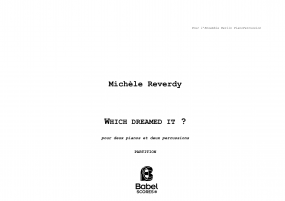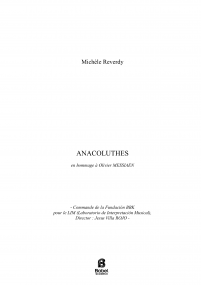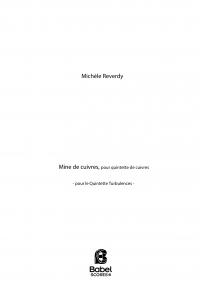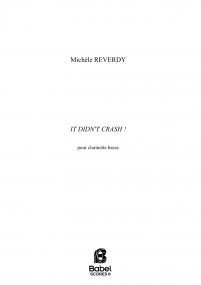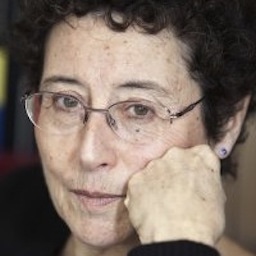
Michèle Reverdy
Play all audio recordingsBorn in Alexandria, Egypt, in 1943, Michèle Reverdy occupies a most singular position. She is an alert spectator of the overfill of current musical life, and her own analytical spirit and her taste for the art of transmission (since 1983 she has taught musical analysis and orchestration at the Paris Conservatory where she undertook all her own music studies, notably with Olivier Messiaen and Claude Ballif) contrast with the powerful amnesia that presides over every one of her works.
This spontaneous forgetfulness as she sits down to write a new work is matched only by the complete virginity of the blank page and an incapacity to assimilate any element of backward-looking nostalgia or any of the tools of postmodernity. Because Michèle Reverdy associates composing with exploring, none of her works rests on any pre-existent musical language, it vibrates with its own dramaturgical substance and creates its own harmonic reservoir: from this springs work on melody, together with cellular growth through dissemination (the relationship with painting is then explicit) and a rhythmic vitality that, all of them, bear witness to human liberty.
Thus preformed and in-formed, every score is, during the compositional process, subject to a double interrogation, via the pianistic instrumental experience, then through an intuition of the voice. From the instrumental point of view, and respecting both acoustic instrument making and modes of play that are in a state of permanent renewal, Michèle Reverdy is keenly anxious to secure the pragmatism of her chosen performers. And from the point of view of the voice, she recalls that as a child it was through opera that music grasped her and assured her she would “spend her creative time composing operas”. Such a passion for the voice enables one to see how each of her works, even instrumental, seems to have been torn from so many imaginary operas.
This omnipresent vocality, as should be clear, is indeed the great unifying stamp on her catalogue, placed under the sign of amnesia, in which each score quite happily pursues its path in complete independence. This can be seen in the poets she chooses, whether classical (Jakob Lenz, Aloysius Bertrand, Victor Hugo, Franz Kafka,
Lewis Carroll, Tristan Corbière, Saint John of the Cross, Federico Garcia Lorca, etc.) or contemporary (Paul Eluard, Italo Calvino, Jorge Luis Borges, Yasushi Inoue, Christa Wolf, Pascal Quignard, Jean-Claude Buchard et Christian Doumet).
Frank Langlois - translated by Jeremy Drake
www.michelereverdy.com
This spontaneous forgetfulness as she sits down to write a new work is matched only by the complete virginity of the blank page and an incapacity to assimilate any element of backward-looking nostalgia or any of the tools of postmodernity. Because Michèle Reverdy associates composing with exploring, none of her works rests on any pre-existent musical language, it vibrates with its own dramaturgical substance and creates its own harmonic reservoir: from this springs work on melody, together with cellular growth through dissemination (the relationship with painting is then explicit) and a rhythmic vitality that, all of them, bear witness to human liberty.
Thus preformed and in-formed, every score is, during the compositional process, subject to a double interrogation, via the pianistic instrumental experience, then through an intuition of the voice. From the instrumental point of view, and respecting both acoustic instrument making and modes of play that are in a state of permanent renewal, Michèle Reverdy is keenly anxious to secure the pragmatism of her chosen performers. And from the point of view of the voice, she recalls that as a child it was through opera that music grasped her and assured her she would “spend her creative time composing operas”. Such a passion for the voice enables one to see how each of her works, even instrumental, seems to have been torn from so many imaginary operas.
This omnipresent vocality, as should be clear, is indeed the great unifying stamp on her catalogue, placed under the sign of amnesia, in which each score quite happily pursues its path in complete independence. This can be seen in the poets she chooses, whether classical (Jakob Lenz, Aloysius Bertrand, Victor Hugo, Franz Kafka,
Lewis Carroll, Tristan Corbière, Saint John of the Cross, Federico Garcia Lorca, etc.) or contemporary (Paul Eluard, Italo Calvino, Jorge Luis Borges, Yasushi Inoue, Christa Wolf, Pascal Quignard, Jean-Claude Buchard et Christian Doumet).
Frank Langlois - translated by Jeremy Drake
www.michelereverdy.com
Featured Pieces
Cinq mélodies pour voix de baryton et piano, textes de Joachim Du Bellay, Sandro Penna,
Lewis Carroll, Hans-Ulrich Treichel, Federico Garcia Lorca
9 E Instrumentation
Cinq mélodies pour voix d'alto ou mezzo-soprano et piano
textes de Joachim Du Bellay, Sandro Penna, Lewis Carroll, Hans-Ulrich Treichel, Federico Garcia Lorca
9 E Instrumentation
pour deux pianos, deux percussions
11 E Instrumentation
Quintette de cuivres
10 E Instrumentation
Piezas ordenadas por año. Los trabajos mas recientes aparecen primero
pour choeur et grand orchestre
texte de Paul Verlaine
Michèle Reverdy
d'après la Divine Comédie de Dante
Michèle Reverdy
pour hautbois
Michèle Reverdy
pour piano, violon et violoncelle
Michèle Reverdy
pour mandoline, clavecin, viole de gambe et théorbe
Michèle Reverdy
quatuor à cordes
Michèle Reverdy
pour soprano, ténor et piano
Michèle Reverdy
pour 18 instruments
Michèle Reverdy
quatuor à cordes pour la Nuit Blanche Paris, musée de l'Orangerie
Michèle Reverdy
Opéra pour un théâtre d'ombres 3 chanteurs 8 instruments
texte original de Julien Mages
Michèle Reverdy
Trio piano violon violoncelle
Hommage à Clara Schumann
Michèle Reverdy
poème de Christian Doumet d'après le Triptyque Portinari de Hugo van der Goes
Michèle Reverdy
violon seul
Michèle Reverdy
Mélodrame sur un texte de Jorge Luis Borges pour un acteur et ensemble instrumental
Michèle Reverdy
Espresso 5 pour mezzo soprano ténor et piano
texte d'Honoré de Balzac
Michèle Reverdy
Espresso 4, pour voix de mezzo soprano et guitare
texte de Christian Doumet
Michèle Reverdy
pour hautbois et cor niveau 3ème cycle des Conservatoires
Michèle Reverdy
Omaggio a Luigi Nono, pour flûte et clarinette en si bémol
Michèle Reverdy
Petit motet pour chœur d'enfants, quatuor à cordes et harpe
Michèle Reverdy
pour choeur d'enfants et orgue, composé pour la Maîtrise de Notre-Dame de Paris
Michèle Reverdy
Piano seul
Michèle Reverdy
pour deux clarinettes niveau 3ème cycle de conservatoire
Michèle Reverdy
pour deux violons, niveau 3ème cycle Conservatoires
Michèle Reverdy
Opera buffa d'après Italo Calvino. Un segno nello spazio, Tutto in un punto
Michèle Reverdy
Quatuor à cordes en quatre mouvements (suite tirée du Roi du bois, opéra parlé, texte de Pierre Michon)
1- Que d'ombres autour de nous
2- Une fille très parée qui riait
3- J'avais une visitation
4- La main ouverte
Michèle Reverdy
"Opéra parlé" pour acteur, quatuor à cordes et un enfant chanteur sur le texte de Pierre Micbon
Michèle Reverdy
Etude pour quatre timbales
Michèle Reverdy
Harpe et Quatuor à cordes
Michèle Reverdy
Cinq mélodies pour voix de baryton et piano, textes de Joachim Du Bellay, Sandro Penna,
Lewis Carroll, Hans-Ulrich Treichel, Federico Garcia Lorca
Michèle Reverdy
Cinq mélodies pour voix d'alto ou mezzo-soprano et piano
textes de Joachim Du Bellay, Sandro Penna, Lewis Carroll, Hans-Ulrich Treichel, Federico Garcia Lorca
Michèle Reverdy
pour deux pianos, deux percussions
Michèle Reverdy
Hommage à Messiaen
Michèle Reverdy
Trois mélodies pour voix de mezzo-soprano et trio de cordes pincées
(harpe, guitare, mandoline)
Texte de José Tono Martinez
Michèle Reverdy
Quintette de cuivres
Michèle Reverdy
Pour voix de femme et harpe
textes de Tristan Corbière
1- Sonnet avec la manière de s'en servir
2- Le poète contumace
3- Paris
Michèle Reverdy
Clarinette basse
Michèle Reverdy
Resultados 1 - 36 de 36
Voces e Instrumentos
Crimen Amoris pour choeur et grand orchestre texte de Paul Verlaine (2023)
Femme revêtue de soleil Petit motet pour chœur d'enfants, quatuor à cordes et harpe (2014)
Petit Motet pour le Livre de Notre-Dame de Paris pour choeur d'enfants et orgue, composé pour la Maîtrise de Notre-Dame de Paris (2014)
Traité des excitants modernes Espresso 5 pour mezzo soprano ténor et piano texte d'Honoré de Balzac (2014)
Grupo de Cámara ( 2 - 4 instrumentos )
Passacaglia Galante pour mandoline, clavecin, viole de gambe et théorbe (2022)
TRIO POUR OWON pour piano, violon et violoncelle (2022)
Terza Rima d'après la Divine Comédie de Dante (2022)
Troisième quatuor à cordes (2021)
Fragments d'un discours Trio piano violon violoncelle Hommage à Clara Schumann (2018)
Quatuor pour Maud quatuor à cordes pour la Nuit Blanche Paris, musée de l'Orangerie (2018)
Miroirs Omaggio a Luigi Nono, pour flûte et clarinette en si bémol (2014)
Espresso N°1 pour deux clarinettes niveau 3ème cycle de conservatoire (2014)
Espresso N°3 pour hautbois et cor niveau 3ème cycle des Conservatoires (2014)
Espresso N°2 pour deux violons, niveau 3ème cycle Conservatoires (2014)
Quatre eaux-fortes Quatuor à cordes en quatre mouvements (suite tirée du Roi du bois, opéra parlé, texte de Pierre Michon) 1- Que d'ombres autour de nous 2- Une fille très parée qui riait 3- J'avais une visitation 4- La main ouverte (2013)
Which dreamed it ? pour deux pianos, deux percussions (2009)
Instrumento Solo
TROPES pour hautbois (2022)
Un violon pour Caroline violon seul (2016)
Alep Piano seul (2014)
Le cheminement d'un timbalier Etude pour quatre timbales (2011)
It didn t crash ! Clarinette basse (1991)
Cuarteto de Cuerdas
Troisième quatuor à cordes (2021)
Quatuor pour Maud quatuor à cordes pour la Nuit Blanche Paris, musée de l'Orangerie (2018)
Quatre eaux-fortes Quatuor à cordes en quatre mouvements (suite tirée du Roi du bois, opéra parlé, texte de Pierre Michon) 1- Que d'ombres autour de nous 2- Une fille très parée qui riait 3- J'avais une visitation 4- La main ouverte (2013)
Voz solo y acompañamiento
Rome, rideau pour soprano, ténor et piano (2020)
Soixante et quelques mains pour la Nativité poème de Christian Doumet d'après le Triptyque Portinari de Hugo van der Goes (2017)
La Donation du monde Espresso 4, pour voix de mezzo soprano et guitare texte de Christian Doumet (2014)
De l’ironie contre l’absurdité du monde version voix d' alto Cinq mélodies pour voix d'alto ou mezzo-soprano et piano textes de Joachim Du Bellay, Sandro Penna, Lewis Carroll, Hans-Ulrich Treichel, Federico Garcia Lorca (2009)
De l'ironie contre l'absurdité du monde pour voix de baryton et piano Cinq mélodies pour voix de baryton et piano, textes de Joachim Du Bellay, Sandro Penna, Lewis Carroll, Hans-Ulrich Treichel, Federico Garcia Lorca (2009)
La Caja de Pandora Trois mélodies pour voix de mezzo-soprano et trio de cordes pincées (harpe, guitare, mandoline) Texte de José Tono Martinez (2007)
Les amours jaunes Pour voix de femme et harpe textes de Tristan Corbière 1- Sonnet avec la manière de s'en servir 2- Le poète contumace 3- Paris (2005)
Opera
Ombres du Minotaure Opéra pour un théâtre d'ombres 3 chanteurs 8 instruments texte original de Julien Mages (2018)
Le Cosmicomiche Opera buffa d'après Italo Calvino. Un segno nello spazio, Tutto in un punto (2013)
Ensamble de Cámara (5 - 9 instrumentos)
Ni d'ici ni d'ailleurs Harpe et Quatuor à cordes (2010)
Anacoluthes Hommage à Messiaen (2008)
Mine de cuivres Quintette de cuivres (2007)
Alep Piano seul (2014)
Anacoluthes Hommage à Messiaen (2008)
Crimen Amoris pour choeur et grand orchestre texte de Paul Verlaine (2023)
De l'ironie contre l'absurdité du monde pour voix de baryton et piano Cinq mélodies pour voix de baryton et piano, textes de Joachim Du Bellay, Sandro Penna, Lewis Carroll, Hans-Ulrich Treichel, Federico Garcia Lorca (2009)
De l’ironie contre l’absurdité du monde version voix d' alto Cinq mélodies pour voix d'alto ou mezzo-soprano et piano textes de Joachim Du Bellay, Sandro Penna, Lewis Carroll, Hans-Ulrich Treichel, Federico Garcia Lorca (2009)
Espresso N°1 pour deux clarinettes niveau 3ème cycle de conservatoire (2014)
Espresso N°2 pour deux violons, niveau 3ème cycle Conservatoires (2014)
Espresso N°3 pour hautbois et cor niveau 3ème cycle des Conservatoires (2014)
Femme revêtue de soleil Petit motet pour chœur d'enfants, quatuor à cordes et harpe (2014)
Ficciones-Las Ruinas circulares Mélodrame sur un texte de Jorge Luis Borges pour un acteur et ensemble instrumental (2015)
Fragments d'un discours Trio piano violon violoncelle Hommage à Clara Schumann (2018)
It didn t crash ! Clarinette basse (1991)
L'homme qui marche pour 18 instruments (2019)
La Caja de Pandora Trois mélodies pour voix de mezzo-soprano et trio de cordes pincées (harpe, guitare, mandoline) Texte de José Tono Martinez (2007)
La Donation du monde Espresso 4, pour voix de mezzo soprano et guitare texte de Christian Doumet (2014)
Le cheminement d'un timbalier Etude pour quatre timbales (2011)
Le Cosmicomiche Opera buffa d'après Italo Calvino. Un segno nello spazio, Tutto in un punto (2013)
Le Roi du bois "Opéra parlé" pour acteur, quatuor à cordes et un enfant chanteur sur le texte de Pierre Micbon (2012)
Les amours jaunes Pour voix de femme et harpe textes de Tristan Corbière 1- Sonnet avec la manière de s'en servir 2- Le poète contumace 3- Paris (2005)
Mine de cuivres Quintette de cuivres (2007)
Miroirs Omaggio a Luigi Nono, pour flûte et clarinette en si bémol (2014)
Ni d'ici ni d'ailleurs Harpe et Quatuor à cordes (2010)
Ombres du Minotaure Opéra pour un théâtre d'ombres 3 chanteurs 8 instruments texte original de Julien Mages (2018)
Passacaglia Galante pour mandoline, clavecin, viole de gambe et théorbe (2022)
Petit Motet pour le Livre de Notre-Dame de Paris pour choeur d'enfants et orgue, composé pour la Maîtrise de Notre-Dame de Paris (2014)
Quatre eaux-fortes Quatuor à cordes en quatre mouvements (suite tirée du Roi du bois, opéra parlé, texte de Pierre Michon) 1- Que d'ombres autour de nous 2- Une fille très parée qui riait 3- J'avais une visitation 4- La main ouverte (2013)
Quatuor pour Maud quatuor à cordes pour la Nuit Blanche Paris, musée de l'Orangerie (2018)
Rome, rideau pour soprano, ténor et piano (2020)
Soixante et quelques mains pour la Nativité poème de Christian Doumet d'après le Triptyque Portinari de Hugo van der Goes (2017)
Terza Rima d'après la Divine Comédie de Dante (2022)
Traité des excitants modernes Espresso 5 pour mezzo soprano ténor et piano texte d'Honoré de Balzac (2014)
TRIO POUR OWON pour piano, violon et violoncelle (2022)
Troisième quatuor à cordes (2021)
TROPES pour hautbois (2022)
Un violon pour Caroline violon seul (2016)
Which dreamed it ? pour deux pianos, deux percussions (2009)
Anacoluthes Hommage à Messiaen (2008)
Crimen Amoris pour choeur et grand orchestre texte de Paul Verlaine (2023)
De l'ironie contre l'absurdité du monde pour voix de baryton et piano Cinq mélodies pour voix de baryton et piano, textes de Joachim Du Bellay, Sandro Penna, Lewis Carroll, Hans-Ulrich Treichel, Federico Garcia Lorca (2009)
De l’ironie contre l’absurdité du monde version voix d' alto Cinq mélodies pour voix d'alto ou mezzo-soprano et piano textes de Joachim Du Bellay, Sandro Penna, Lewis Carroll, Hans-Ulrich Treichel, Federico Garcia Lorca (2009)
Espresso N°1 pour deux clarinettes niveau 3ème cycle de conservatoire (2014)
Espresso N°2 pour deux violons, niveau 3ème cycle Conservatoires (2014)
Espresso N°3 pour hautbois et cor niveau 3ème cycle des Conservatoires (2014)
Femme revêtue de soleil Petit motet pour chœur d'enfants, quatuor à cordes et harpe (2014)
Ficciones-Las Ruinas circulares Mélodrame sur un texte de Jorge Luis Borges pour un acteur et ensemble instrumental (2015)
Fragments d'un discours Trio piano violon violoncelle Hommage à Clara Schumann (2018)
It didn t crash ! Clarinette basse (1991)
L'homme qui marche pour 18 instruments (2019)
La Caja de Pandora Trois mélodies pour voix de mezzo-soprano et trio de cordes pincées (harpe, guitare, mandoline) Texte de José Tono Martinez (2007)
La Donation du monde Espresso 4, pour voix de mezzo soprano et guitare texte de Christian Doumet (2014)
Le cheminement d'un timbalier Etude pour quatre timbales (2011)
Le Cosmicomiche Opera buffa d'après Italo Calvino. Un segno nello spazio, Tutto in un punto (2013)
Le Roi du bois "Opéra parlé" pour acteur, quatuor à cordes et un enfant chanteur sur le texte de Pierre Micbon (2012)
Les amours jaunes Pour voix de femme et harpe textes de Tristan Corbière 1- Sonnet avec la manière de s'en servir 2- Le poète contumace 3- Paris (2005)
Mine de cuivres Quintette de cuivres (2007)
Miroirs Omaggio a Luigi Nono, pour flûte et clarinette en si bémol (2014)
Ni d'ici ni d'ailleurs Harpe et Quatuor à cordes (2010)
Ombres du Minotaure Opéra pour un théâtre d'ombres 3 chanteurs 8 instruments texte original de Julien Mages (2018)
Passacaglia Galante pour mandoline, clavecin, viole de gambe et théorbe (2022)
Petit Motet pour le Livre de Notre-Dame de Paris pour choeur d'enfants et orgue, composé pour la Maîtrise de Notre-Dame de Paris (2014)
Quatre eaux-fortes Quatuor à cordes en quatre mouvements (suite tirée du Roi du bois, opéra parlé, texte de Pierre Michon) 1- Que d'ombres autour de nous 2- Une fille très parée qui riait 3- J'avais une visitation 4- La main ouverte (2013)
Quatuor pour Maud quatuor à cordes pour la Nuit Blanche Paris, musée de l'Orangerie (2018)
Rome, rideau pour soprano, ténor et piano (2020)
Soixante et quelques mains pour la Nativité poème de Christian Doumet d'après le Triptyque Portinari de Hugo van der Goes (2017)
Terza Rima d'après la Divine Comédie de Dante (2022)
Traité des excitants modernes Espresso 5 pour mezzo soprano ténor et piano texte d'Honoré de Balzac (2014)
TRIO POUR OWON pour piano, violon et violoncelle (2022)
Troisième quatuor à cordes (2021)
TROPES pour hautbois (2022)
Un violon pour Caroline violon seul (2016)
Which dreamed it ? pour deux pianos, deux percussions (2009)

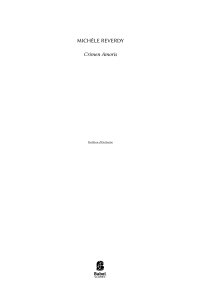
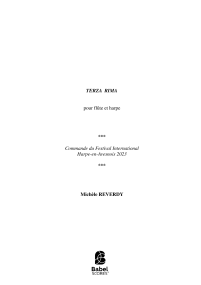
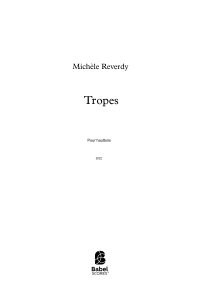
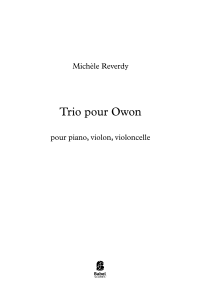
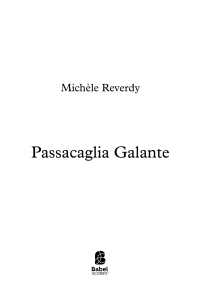
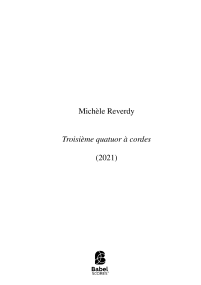
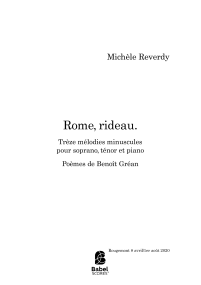
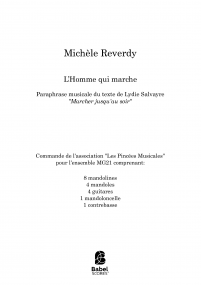
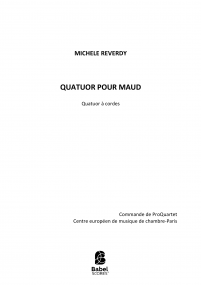
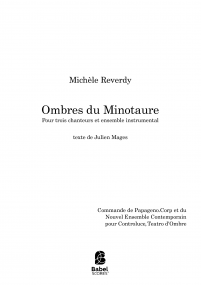
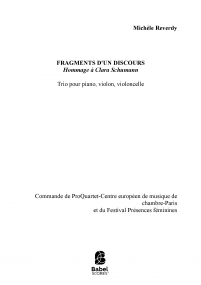
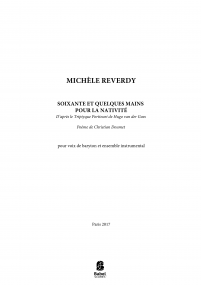
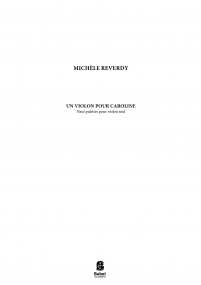
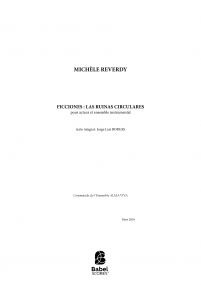
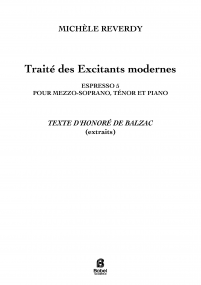
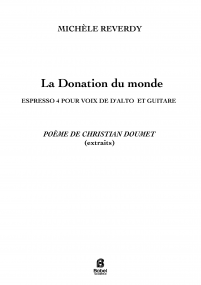
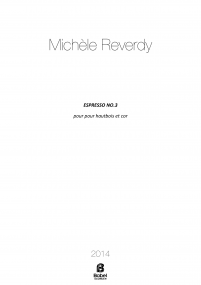
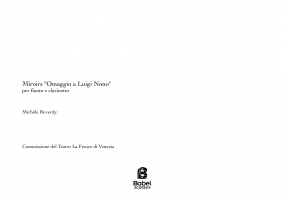
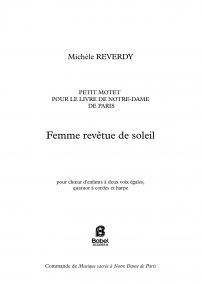
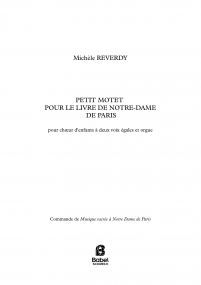
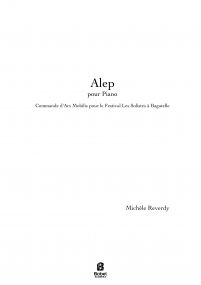
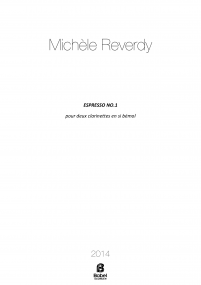
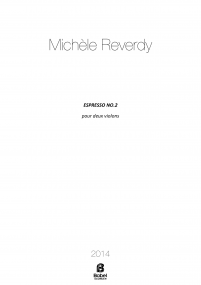
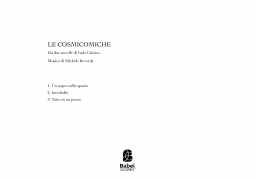
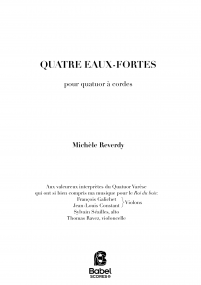
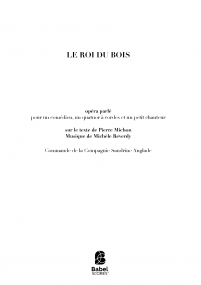



z_285x285.png)
